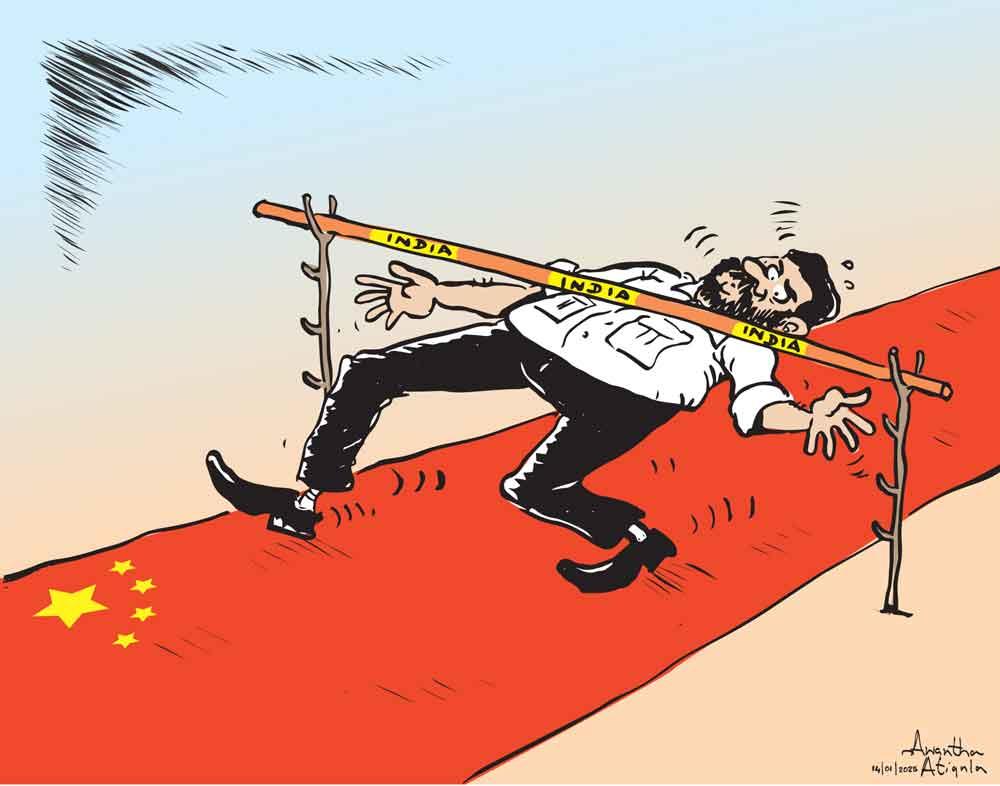FrontLine Socialist Party (FLSP), a breakaway group from ruling Marxists Janatha Vimukthi Peramuna warned Sri Lanka government of stepping into a geopolitical war involved with regional powers India and China after President Anura Kumara Disanayake’s visit to the both countries.
President Disanayake last week visited China, a month after his first official foreign visit to India.
During his visit to China, President Dissanayake agreed to follow eight major steps announced by Chinese President Xi Jinping for supporting high-quality Belt and Road cooperation and take forward all major projects including the joint development of the Colombo Port City and Hambantota Port.
The central committee of the FLSP, which is a breakaway party from President Disanayake-led Janatha Vimukthi Peramuna (JVP) said Belt and Road Initiative is “a geopolitical strategy of China in the South China Sea and the Indian Ocean”, instead of an economic development programme.
“The United States is pursuing what it calls the “Indo-Pacific Strategy” against China, and it is no secret that this power struggle has been creating acute tensions in the Asian region, including the Indian Ocean region,” the FLSP said in a statement.
“It could escalate from an economic, trade war and political, diplomatic confrontation to an open military conflict.”
The FLSP was partly behind Sri Lanka’s mass protests in 2022 which led to ousting former leader Gotabaya Rajapaksa and his government. However, analysts say it could not capitalize the party’s success of ousting a strong leader to electoral victory like JVP.
HEAVY CRITICISM OVER CHINA
The JVP when in opposition has strongly criticized successive governments over leasing Hambatota port to China on a 99-year lease and allowing Beijing to construct Port City adjacent to the main port in commercial capital Colombo.
The FLSP said an assessment of the joint statement Sri Lanka issued with India on December 16 and China on January 16 reveals that Sri Lanka is entering the major geopolitical war in the Indian Ocean region.
During President Disanayake’s Chinese visit, Sri Lanka signed a deal with state-run Sinopec to construct the island nation’s largest refinery with an investment of $3.7 billion near the deep southern port of Hambantota, which is now owned by China until 2116.
The FLSP said the Sinopec refinery project raises concerns over increasing geopolitical tension, country’s energy sovereignty, and the way money will be invested in the project while a proposed oil pipeline project with India could dent the country’s revenue in bunkering fuel supply.
“This is not only a matter of losing revenue, but also a risk that Sri Lanka will lose its energy sovereignty, and the provision of military facilities at these ports poses a threat to national security,” the FLSP said.
“All these agreements indicate that (Sri Lanka’s) North and East are under Indian domination, while the Southern province, including Hambantota, is under Chinese authority.”
“The fact that these regional powers are preparing for a strong intervention in Colombo makes this danger even more serious.”
The FLSP called public attention to the ongoing political dynamics that threaten “not only the economic independence of Sri Lanka, but also the political independence and security of the people”.
“We believe that the positions taken by the government in the face of the geopolitical conflict that have emerged in connection with the President’s visits to India and China are extremely serious.”
“…we appeal to the working people, including the able masses, for an organized intervention to create alternatives to the economic – political – geopolitical – military challenges faced by Sri Lanka and to make them a reality.”


